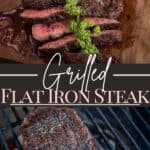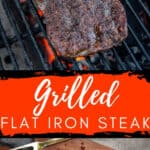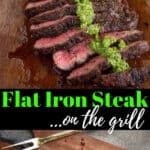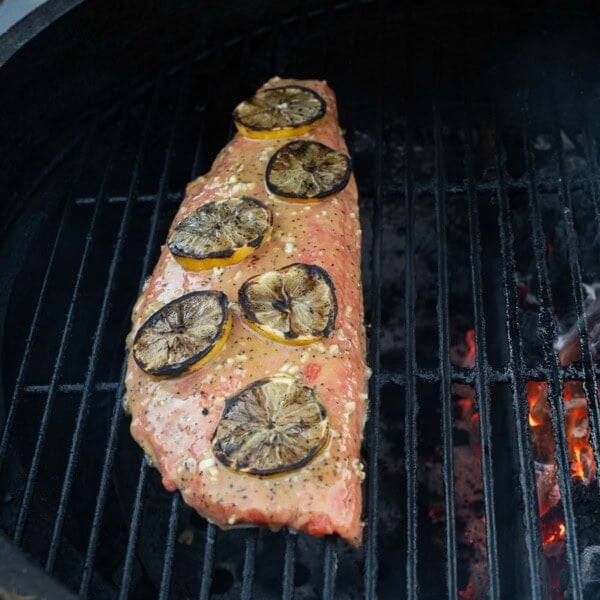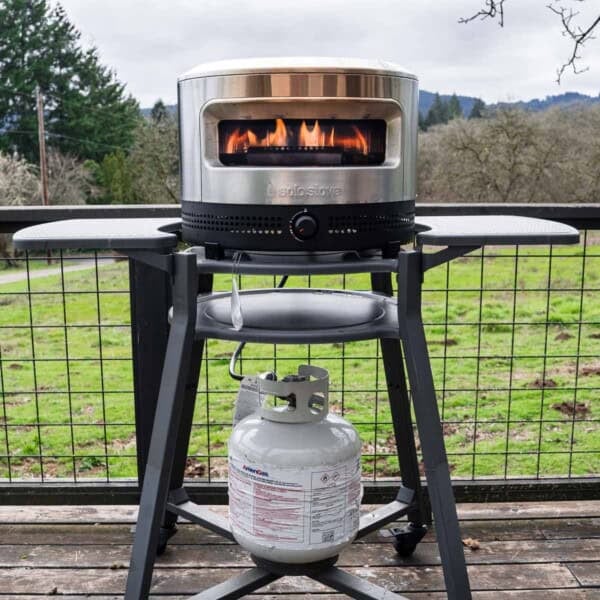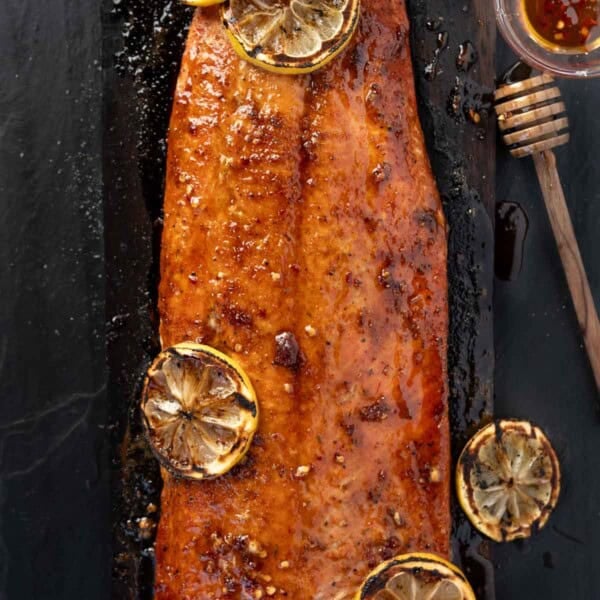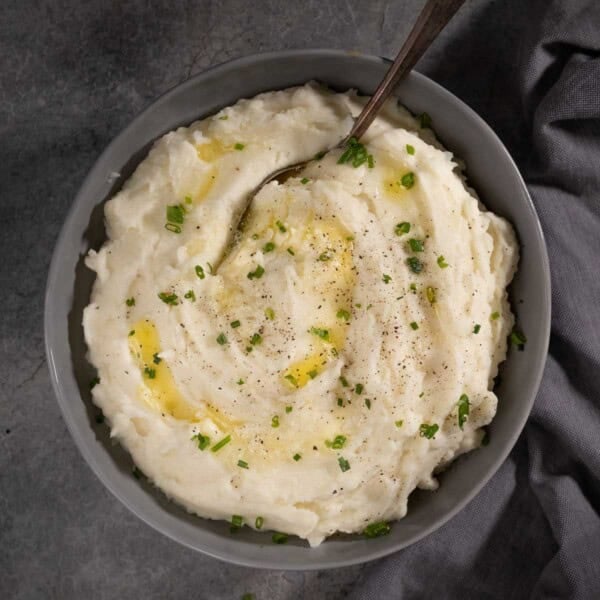This post may contain affiliate links. Read more at our disclosure policy.
Grilled Flat Iron Steak is beefy, tender, and full of marbling. The background on this steak cut is even more interesting. And the secret to the best results is to grill it hot and fast for the best flavor.
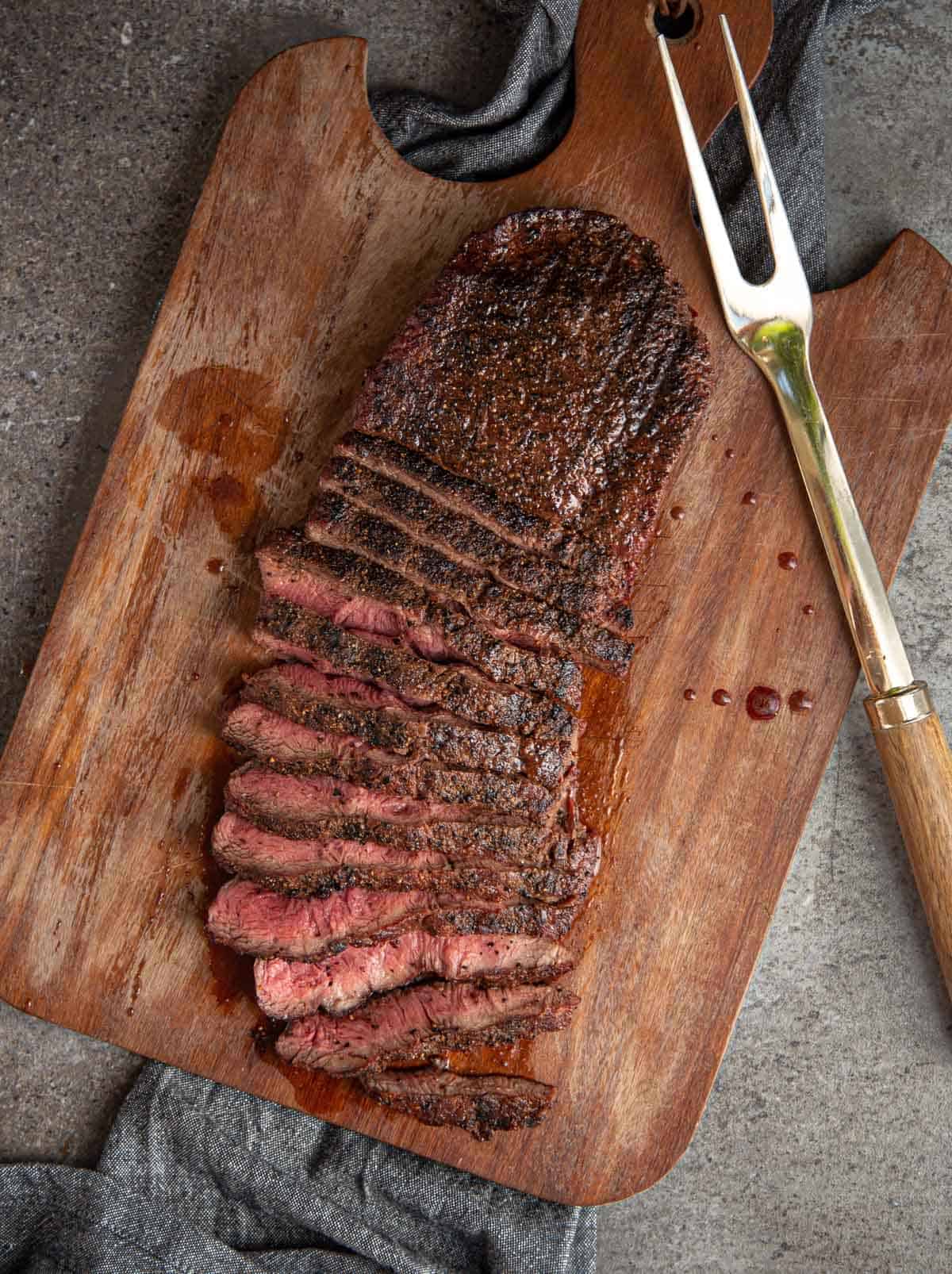
Table of Contents
Background
Flat Iron Steak was only recently “discovered” when a few meat scientists got together to find new and interesting steak cuts from various parts of the steer. Prior to 2002 this cut of steak didn’t exist (or at least it was buried in the chuck primal cut more known for ground beef and slow roasts). After time, and likely a LOT of leftovers, the flat iron was discovered and marketed as a new steak cut.
What is Flat Iron Steak
The steak comes from the shoulder clod or chuck shoulder primal cut. The chuck is broken down into multiple cuts, like the top blade. From the top blade, the flat iron is then separated into its own steak.
A flat iron steak will typically be 1 – 1 1/2 pounds and rectangular in size, with modest thickness to it, and should have the silver skin and fat caps removed already by the butcher. The marbling is very distinct and it is a very tender texture. It is rich and beefy in flavor.
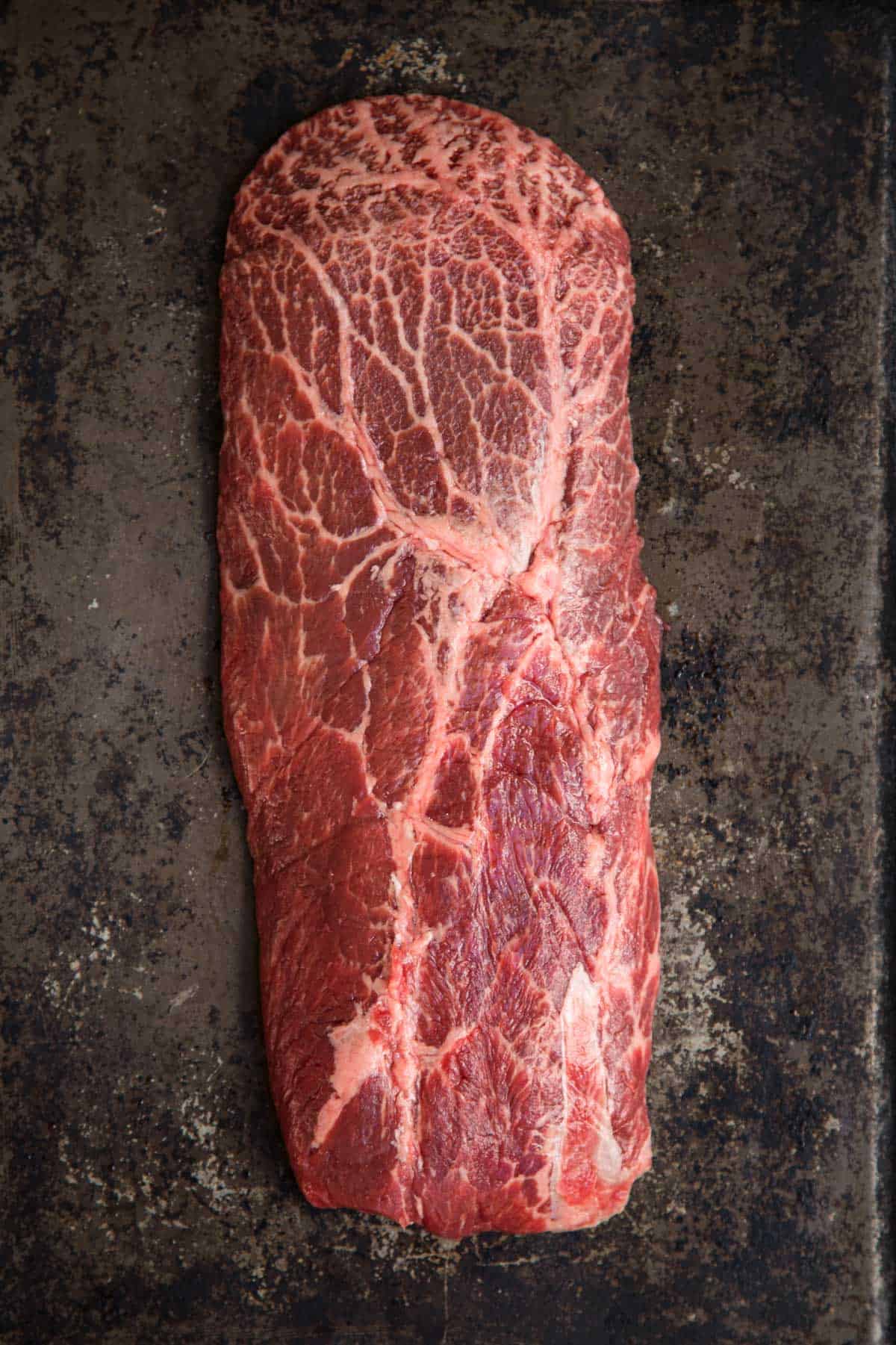
Alternatives to Flat Iron, if you can’t find it, is flank steak or bavette steak. While they won’t have the same marbling, the shape and texture will be the closest, as well as how they grill. Another great cut from the shoulder of beef is Teres Major (used in our recipe for Steak Skewers).
How to Cook Flat Iron Steak
Flat Iron is best prepared hot and fast by searing each side, which makes grilling the perfect option. It will cook quickly, getting to medium-rare within a few minutes, so it’s also a cut to watch closely as it grills.
It is ideal to push down on the steak against the grill in order to ensure a good even sear. I really would not recommend cooking your flat steak beyond the recommended limit or it will be tougher. If you accidentally overcook it then slice your steak thin when you eat it.
How to Prepare Flat Iron Steak
A flatiron steak should already be well butchered. There may be some slight silver skin that needs to come off as well as rounding out any extra edges that are thin or hanging off the cut. Having a great boning or filet knife helps with removing the silver skin.
Would you like to save this?
Flat Iron Seasoning
For seasoning, flat steak doesn’t need a marinade. The marbling and flavor will add quite a beefy taste and it’s tender already. However, if you do want to marinate try our red wine marinade from our flank steak recipe. Marinate for a total of 2 hours, as it’s a smaller cut and that is plenty of time to add flavor.
For a dry rub we use our Beef SPG Rub, which is a blend of kosher salt, coarse black pepper, and granulated garlic. It’s simple but its perfect to add flavor but not lose the amazing beef flavor of the steak.
How to Grill Flat Iron Steak
- Preheat Grill – Use the direct method of grilling with the heat source directly under the flat iron when cooking. Target 500 degrees Fahrenheit over the direct heat.
- Season Steak – Apply olive oil to the flat steak to allow the rub to stick and generously season the steak with the salt, pepper, and granulated garlic.
- Grill Direct – Grill the first side for 3 – 4 minutes or until you see a nice crust form. Flip the steak and grill an additional 3 – 4 minutes. Pull the steak off the grill when the internal temperature of the steak reads 125 degrees Fahrenheit using an instant-read thermometer like the Thermoworks MK4 Thermapen.
- Rest – Let the grill rest prior to slicing for 10 minutes. This resting allows carryover cooking to continue which means the internal temperature of the steak will continue to rise, even after off the grill, another 3 – 5 degrees. The additional rest will also allow the juices to redistribute through the meat keeping it juicy.
- Slice – Slice in pencil-thin slices and serve with your favorite toppings like our Jalapeño Chimichurri.
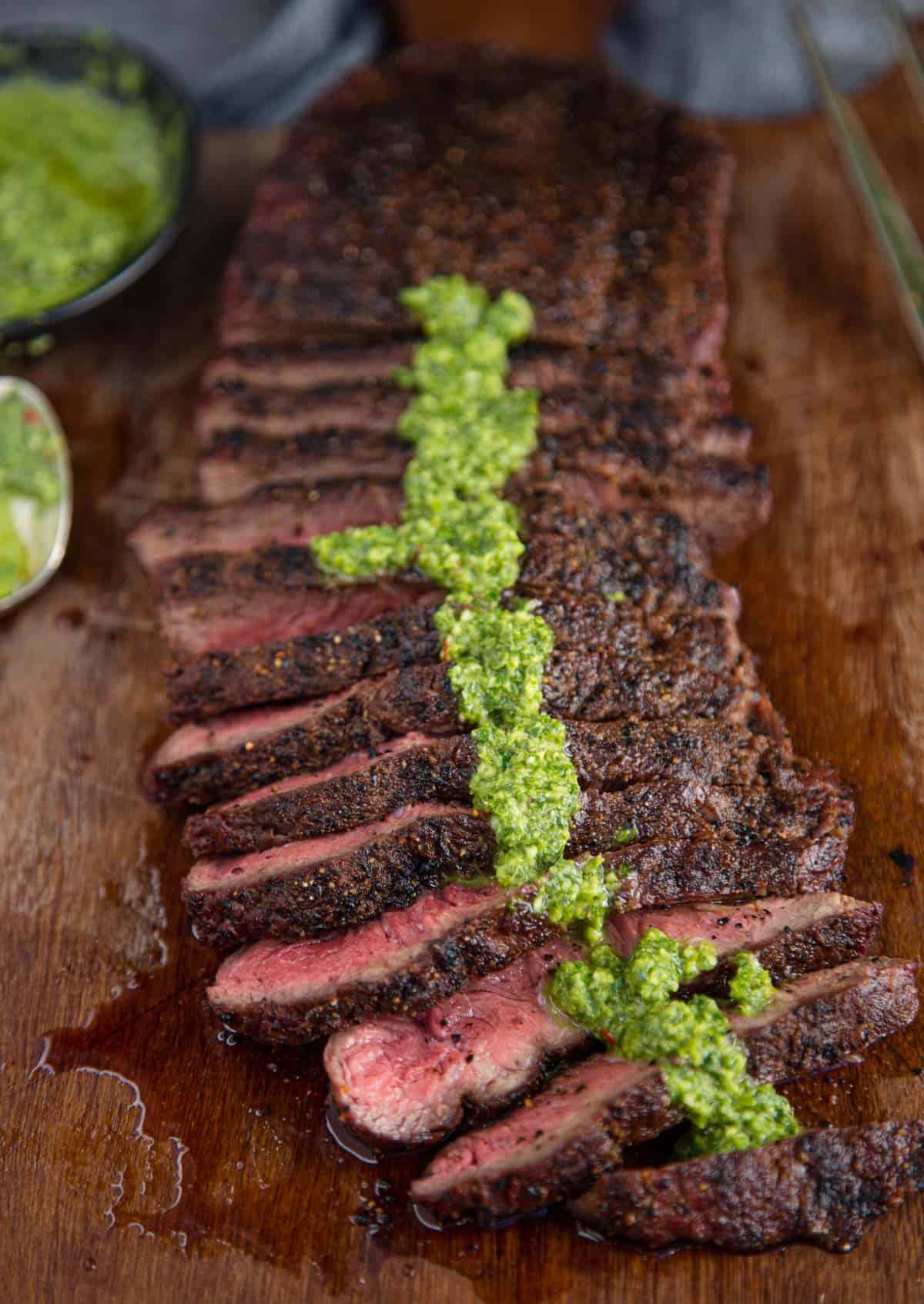
Temperature Ranges for Beef
Remember to allow for carry-over cooking when taking temperature and removing the flat steak from the grill. A high quality instant read thermometer, like the Thermoworks MK4 Thermapen, is a critical tool for grilling and smoking foods.
Beef Temperature Ranges
Be sure to take into consideration the carry-over cooking that happens while the steak rests. For steaks remove them 5 degrees lower than your desired temperature. For roasts remove them 10 degrees lower. The steak’s internal temperature will rise as it rests.
| Black and Blue | 100 – 120° Fahrenheit (F) | 37 – 48° Celsius (C) |
| Rare | 120 – 130° F | 48 – 54° C |
| Medium Rare | 130 – 140° F | 54 – 60° C |
| Medium | 140 – 150° F | 60 – 65° C |
| Medium Well (not recommended) | 150 – 160° F | 65 – 71° C |
| Well Done (not recommended) | 160 – 170° F | 71 – 76° C |
Other Great Steak Cuts on the Grill
- Horseradish Compound Butter on a Grilled Flat Iron Steak
- Grilled Bavette Steak
- Hanger Steak and Pinot Noir Wine Glaze
- Grilled Flank Steak
- Teres Major Skewers
Sides for Grilled Steak
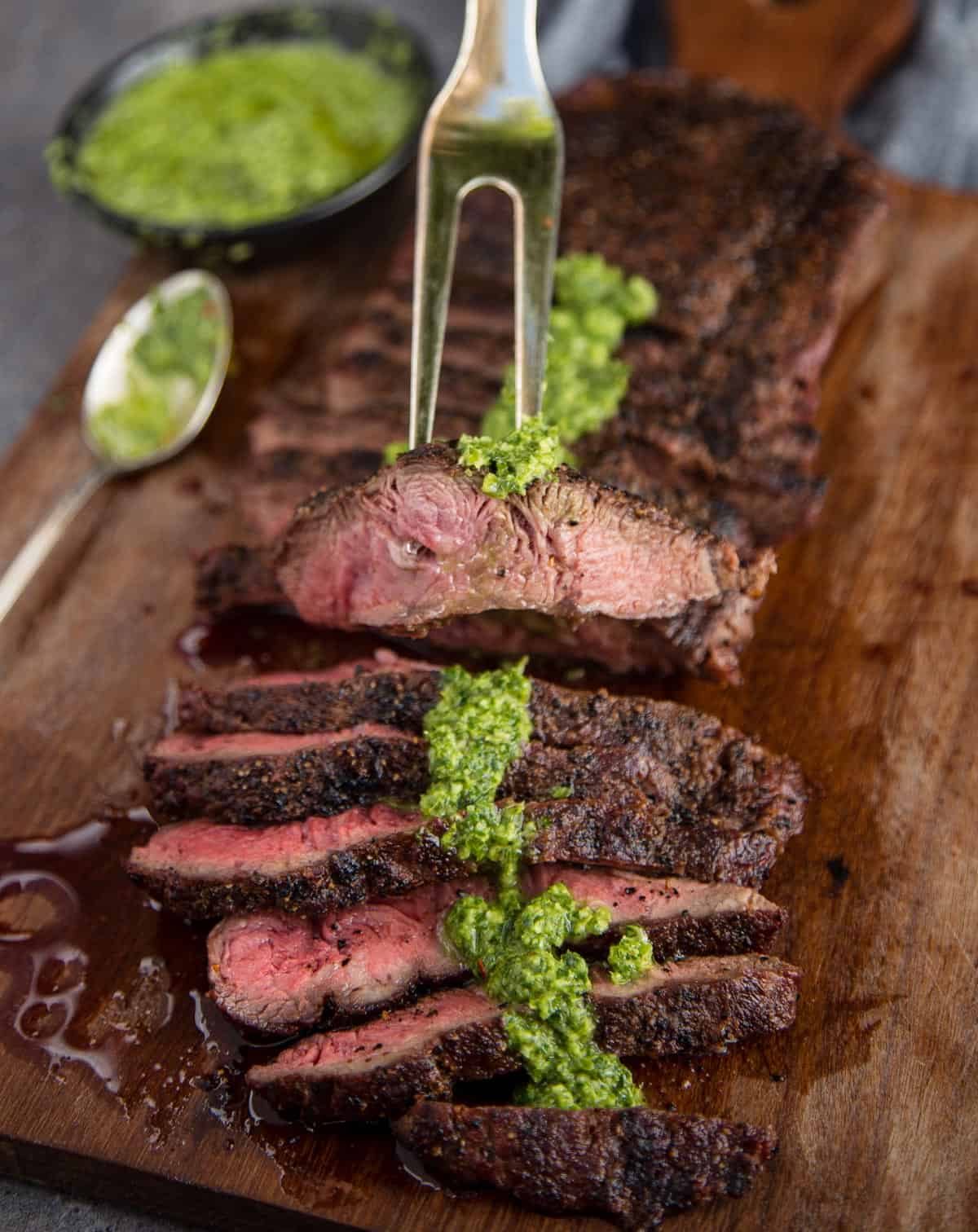
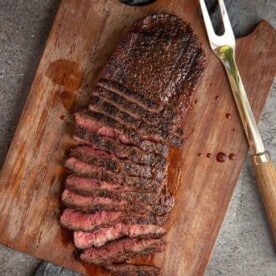
Grilled Flat Iron Steak Recipe
Ingredients
- 1 1 – 1.5 pound Flat Iron steak
- 1 tablespoon extra virgin olive oil
- 1 tablespoon SPG Rub
Instructions
- Preheat Grill: Prepare grill for direct grilling, using lump charcoal targeting 500 degrees Fahrenheit directly under the flat iron.
- Season Steak: Apply olive oil to steak, then generously season the steak with the beef rub.
- Grill Steak: Place the steak on the grill over direct heat. You should hear it sizzle as soon as it hits the grate. Grill over direct heat for 3 – 4 minutes or until you see char marks. Flip the steak over and grill the other side for additional 3 – 4 minutes or until char marks form.
- Remove and Rest: Remove from the grill when the internal temperature of the steak reaches 125 degrees F for rare using an instant read thermometer.Let the steak rest for 10 minutes to allow for carry over cooking, and then slice in pencil thin slices. Serve alone or with our Jalapeño Parsley Chimichurri Sauce.
Notes
Nutrition
Nutrition information is automatically calculated, so should only be used as an approximation.
